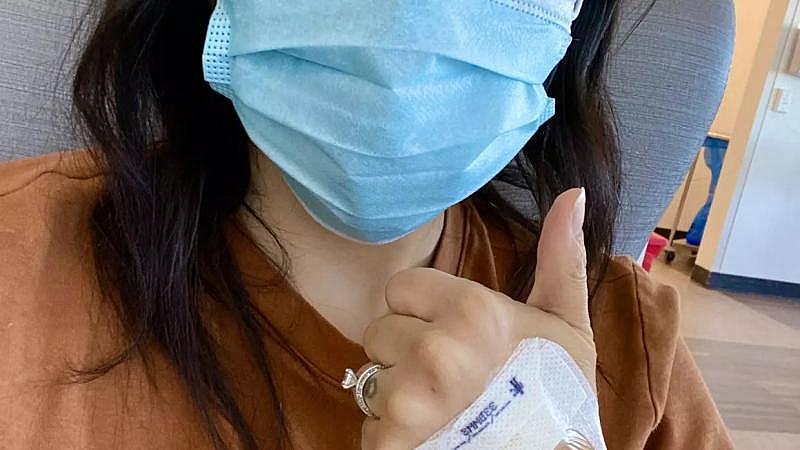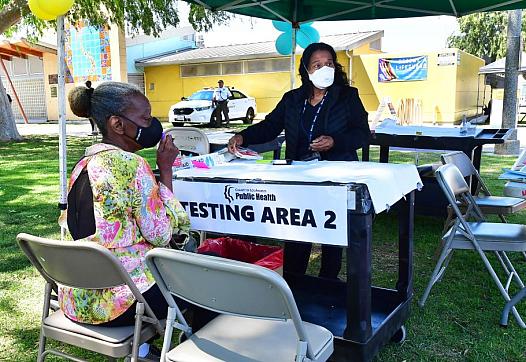What Hispanics and other minorities should know about long Covid
This story was originally published in Univision News with support from the USC Annenberg Center for Health Journalism’s 2022 California Fellowship.
The week of Thanksgiving 2020, Francisco ‘Frank’ Verdugo attended a drive-by birthday party, but his family hadn’t seen each other much due to the Covid-19 pandemic and couldn’t help it. They got out of their cars and “hugged it out,” as Verdugo puts it. A few days later, he woke up gagging on the smell of ammonia.
At the doctor, Verdugo discovered he had contracted the virus. For weeks, he suffered through fevers, headaches and shortness of breath, all of it with a warped sense of taste and smell. Wine, once a favorite indulgence now tasted like vinegar. Eating meat, bread and brushing his teeth became almost unbearable. This distortion is known as parosmia.
It wasn’t until December 24th that year that Verdugo, who is 54 and lives in Calipatria, California, finally tested negative for Covid. His wife and other family members recovered completely much sooner. He returned to work, but still found it difficult to breathe, easily winded by mild strain. Once, it triggered violent nausea, requiring a trip to the emergency room. Going to sleep filled Verdugo with dread, unsure if he would wake up.
But his symptoms persisted and he kept going back to doctors until finally, a doctor diagnosed him with long Covid.
“I went, ‘long Covid, what’s that?’” Verdugo says in a call. “He said, ‘You're still suffering the symptoms of Covid. But yet you're negative.’”
Verdugo says it was like Groundhog Day. Every day he woke up still stuck in this nightmare, also known as long-haul Covid, chronic Covid, post-Covid syndrome, or — if you want to get really technical — post-acute sequelae SARS-CoV-2 infection (PASC.)
No matter what you call it, this is when the symptoms of Covid — such as fatigue, brain fog, trouble breathing, heart palpitations and more — linger for months or even years. It’s a debilitating, scary new illness that medical experts don’t fully understand and there are few treatments.
For Ashley Jackson, a Los Angeles-based actress, screenwriter and producer, long Covid has included frequent “headaches that have progressed into migraines, chest pain that’s still here two years later, trouble breathing, body aches, which then turned into fibromyalgia, and fast heart rate, tachycardia. All that kind of stuff,” she says.
Before all this, Jackson says she was 100 percent healthy. “I honestly call it like a head-shoulders-knees-and-toes game because I can just like identify with a symptom all over my body.”

Dr. Jennie Simpson, Texas Health and Human Services Commission State Forensic Director, speaks at a regional forum on inpatient restoration for mental competency. (Courtesy: Texas Judicial Commission on Mental Health)
Covid has also impacted Jackson’s family. Last summer, her father, the civil rights leader Rev. Jesse Jackson and his wife Jacqueline were hospitalized from Covid, spending weeks at a rehab facility, but both were later released.
Like many aspects of the Covid pandemic, Hispanics and other minorities are getting hit harder than other ethnic groups: Catching the virus more frequently, being hospitalized more, and dying more. Unfortunately, there still isn’t a lot of info on who is suffering the most from lingering Covid symptoms, but some initial reports suggests that minorities are getting disproportionately hit with long Covid as well.
Dr. Jacinda Abdul-Mutakabbir remembers the first time she learned about long Covid. In March 2021, she saw a patient at the Loma Linda University Medical Center, where she works as a critical care pharmacist. The patient had contracted Covid six months prior, but was still having trouble breathing. So they did a chest X-ray and the lungs were completely blacked out, Abdul-Mutakabbir says.
“I had never seen an X-ray of lungs look the way that they do,” Abdul-Mutakabbir says. “That was the moment that I said, ‘Okay, this is definitely going to be an issue in the long run. We had heard murmurings of long Covid at that point, but actually hearing that patient talk to me about it, I was like, ‘Oh no, this is a really big problem.”
Some of the potential issues for minorities include being dismissed or misdiagnosed, reduced access to rehabs or treatments, or even lack of access to basic information about long Covid.
So here’s what anyone with long Covid — but especially Hispanics and Blacks — should know about long Covid to hopefully help get the recovery process started and remind anyone with long Covid they are not alone.
Recognize something is wrong — the symptoms of long Covid
“It's the unknown that is just digging at me. I have no clue what this is doing to me,” Verdugo says about long Covid. “And then when I started getting answers, it was a relief.”
The first thing to recognize is that long Covid symptoms are not all in your head. Many viruses including polio, HIV and swine flu (H1N1) can cause long-term medical problems. Because SARS-CoV-2 is such a relatively new infectious disease, scientists and doctors are still learning about its immediate impacts, let alone the lingering symptoms.
The Centers for Disease Control and Prevention has tallied a lengthy list of long Covid symptoms, including fatigue, fever, difficulty breathing or shortness of breath, coughing, fast-beating or pounding heart (also known as heart palpitations), headaches, dizziness, trouble sleeping and joint or muscle pain. It can also include difficulty thinking or concentrating (sometimes referred to as “ brain fog”), depression, anxiety or changes in menstrual cycles.
Long Covid can mimic circulation disorders like POTS (postural orthostatic tachycardia syndrome) or ME/CFS (myalgic encephalomyelitis/chronic fatigue syndrome). These conditions have (tragically) long been ignored by the medical establishment and few treatments exist. However, because so many people are developing long Covid, and because symptoms for both can overlap, more funding and research for neglected diseases like ME/CFS is increasing.
Finding the right doctor can be a big relief
Many people have reported being dismissed or not listened to by their doctors regarding long Covid, while minorities in general are less likely than White people to have health insurance. So even having a doctor can be a privilege, let alone one that actually hears you.
“It's really alarming how, how much I have had to advocate for my own care,” says Angela Vázquez, the president of Body Politic, a Covid support group which provides thousands of patients and caregivers with vital online resources, including workshops with experts.
Vázquez, who identifies as Chicana, is second generation Mexican-American on her mother’s side while her father’s family has lived in California since before the Mexican-American war. “The border crossed us,” she said. “I’m the granddaughter of immigrants and migrant field workers.”

“I have a private insurance, I am economically very privileged. And I have still had to fight tooth and nail to be believed, to get essential diagnoses and then get treatment to manage my symptoms. I can't even imagine someone who is an essential worker may be a single parent, an immigrant who may or may not have health insurance,” said Vázquez.
All of this can be extremely exhausting and or anyone navigating the medical system, long Covid can make the journey much harder. Recovery can take six months or more, if it ever occurs, so it can require some patience.
“All of my doctors at this stage are very aware of my long Covid and believe it's there,” Jackson says. But a big part of having long Covid can be about advocating for and educating yourself. “If there's something I don't understand, I'm gonna go find a specialist that can go look at that for me, instead of just sitting and waiting for one doctor to believe me,” Jackson adds.
Get your workplace onboard
Keeping a job with long Covid is difficult, but it’s not impossible. Jackson still works in Hollywood, for example and Vázquez works as a mental health policy director at The Children's Partnership, an advocacy group aiming to advance child health equity through research, policy and community engagement. They’ve both been able to adjust their careers around the ebbs and flows of long Covid.
“I have found a rhythm,” Vazquez says. “But I still don't have what my husband — he's an engineer — he calls surge capacity. I have my routine and I have built my life and adjusted my meds. [But] I'm very easily destabilized. And I think … that is the hardest part to plan around.”
For others, however, long Covid has cost their career. A recent report from the Brookings Institution found that as many as 4 million Americans are out of work thanks to long Covid. Last year, the U.S. Equal Employment Opportunity Commission did define long Covid as a disability, which means some workers are entitled to workplace accommodations.
“Making an accommodation for long Covid is really no different than making an accommodation for other medical conditions,” Terri Rhodes, the CEO of the Disability Management Employer Coalition, said in an interview with NPR. It’s important to start conversations with your employer about long Covid as soon as possible.
But working too much can make Covid recovery more difficult, which can translate into the long-term, lingering symptoms. Again, minorities are likely disproportionately experiencing these effects.
These are “communities where perhaps they might not have the ability to take off work and so they're continuing to overwork themselves to the point where they're not able to recover,” says Jennifer Chevinsky, a deputy public health officer at the Riverside County Department of Public Health, in southern California.
How to get on disability
Getting on disability for long Covid is yet another challenge, especially for minitories. There are many different types of disability benefits, but there are portals that can help navigate the bureaucratic maze.
Of those people approved for disability status, fewer tend to be Black, Latinx or Native American, says Abdul-Mutakabbir. “When we think about long Covid, it is not going to do much to make this more equitable.”
Women are getting hit harder
Your sex can play a role in how severe long Covid can be and a lot of research suggests that women get long Covid harder and worse than men. A recent study in the Journal of Women’s Health surveyed 223 patients (89 female and 134 male) and found that women not only had worse symptoms of initial Covid infection, they also had worse long Covid symptoms. Similar research has replicated these findings.
That goes to show that not only is race being overlooked in long Covid treatments, so is sex. “That is also something that I have not really seen researchers talking about, much less looking into is like, what is happening when people are menstruating?” Vázquez says. “An important thing to note that I also think does not get talked about nearly enough is the hormonal component of this disease.”
PTSD is part of long Covid: therapy is crucial
If you have long Covid, it can be extremely difficult for friends and family to understand an “invisible disease.” For Jackson, especially when long Covid wasn’t a well-known phenomenon, there were many days she was afraid she would suddenly drop dead.
“There was so many days that I was in fear of my life,” Jackson says. “I know what it's like to not be able to breathe and to not know if you're gonna live to see another day.”
Trying to translate the rollercoaster of emotions and physical symptoms to others can be almost impossible.
“All of this has definitely been incredibly traumatic.” Vázquez says. “I had evidence of being physically unwell and still no one would actually give me any treatment. I was extremely depressed, especially last summer.”
The sudden fear of getting infected or exposed again can seem like overreacting to someone who hasn’t been disabled by this virus. But for someone with long Covid, having a panic attack can be a normal reaction to learning someone was sick with Covid at the outdoor BBQ they just attended. That’s why it’s important to nourish your mental health as well as your physical health. Therapy can help.
“It took a psychiatrist to help me through and get me to a space now where I can be social again, in some capacity,” Jackson says. There is a mourning process involved as well, realizing your health may never be the same. It’s important to take time to process this grief.
“You can't really understand the experience of getting a disabling chronic illness until you've actually gone through it yourself,” Vázquez says. “It's sort of like asking people who have gone off to war to reintegrate back into society. We've been through something transformational. We'll never be the same again.”
But there are silver linings to long Covid as well. “It's been restraining and liberating,” Jackson says. “There's things I hate about having long Covid. But there's a mindset shift that I think has been kind of powerful. I live life to the fullest now.”
Hope for dealing with long Covid in the future
Even though Frank Verdugo had long Covid for nearly three years, his symptoms have finally started to clear up. There was no trace of inflammation on his latest echocardiogram, a test to measure the health of his heart. However, his sense of taste and smell are still a problem.
“I feel pretty good, but I do get fatigued when my activity levels are pushed,” Verdugo says. “Can't complain though.”
Although it’s been a long journey, with many doctor visits and tests, but Verdugo has made it through, and that means others can, too. Long Covid doesn’t have to last forever, although for some, it may take years to feel entirely healthy again.
The Biden Administration recently called on Congress to increase funding for long Covid research, but it could be years before we have answers. While waiting for better research to along, some public health workers and volunteers are actively attempting to fill in the gaps.
“We just have to be more conscious about thinking about how all these things work together,” Abdul-Mutakabbir says. “So preventive measures [like masks and vaccines], and then what that can look like for long Covid, ultimately thinking about the disparities that exist and the inequities that exist and really be intentional about trying to overcome them.”
More tips of what you should know about long Covid:
1. Get A PCR Test
While the at-home tests that the Biden Administration mailed to everyone can be reliable to test if you have Covid, they may not be enough to get a long Covid diagnosis. This has frustrated many people who clearly developed new, longterm medical problems after contracting Covid, but still can’t get the official long Covid approval of their doctors.
If you catch Covid — even if you feel relatively fine — getting a PCR test is crucial. These are more intensive tests that are more accurate than the at-home brand, but if you don’t have access to a PCR test, keep a photo of the at-home test. It can make navigating long Covid much easier.
2. Join A Support Group
“I joined a support group online since my doctors were doing nothing at the time,” Jackson says. She became part of Body Politic, which you can register for here. Jackson says her online group helped her understand what she was going through and it helped keep her sane.
“I could see the symptoms were there and I wasn't going crazy,” Jackson explains. “If there's a new symptom that pops up, that's where I go first. I'm like, I'll talk to my doctors later. Let me go see what all the patients have been saying. Is this a long Covid thing, is this a me thing? And it's been extremely helpful.”
There are other popular support groups, too, including Survivor Corps, Patient-Led Research Collaborative and the Long Covid Support Group, which has 55,000 members on Facebook. There are many local groups as well that can be found with a quick online search.
3. Treatments Can Vary — Follow the Evidence
Long Covid is an umbrella term which can manifest many different ways. That makes it hard to narrow down treatment. Different drugs or therapies might work for some people and not others. Unfortunately, the data on this so far is pretty scarce.
“It's not clear if any specific medication helps with long Covid or to prevent long Covid,” says Chevinsky. She helped draft the CDC’s interim guidance on treating long Covid.
That can make some Covid treatments a bit of trial and error. Trying antidepressants, steroids or Covid-specific drugs like Paxlovid have been met with mixed success.
That said, there are some treatments that have zero evidence to back up their efficacy. Some desperate long Covid patients are trying them anyway. It can be very complex, so when investigating any claims, it’s important to check multiple, reliable sources and ask experts questions that may arise.
4. Vaccination Can Help, But It Won’t Perform Miracles
The good news about Covid vaccines is that they are safe and seem to make developing long COVID less likely in the first place. Some people even report that getting vaccinated after contracting long Covid or getting a booster shot eased their symptoms.
This isn’t the case for everyone, however. There are still breakthrough cases, where a patient develops long Covid even after getting the shots. But sometimes when something only offers a little protection, it’s better than nothing. Don’t let the perfect be the enemy of the good and ask a doctor about getting a vaccine if you haven’t already. It’s easy to find a place offering vaccination at vaccines.gov

